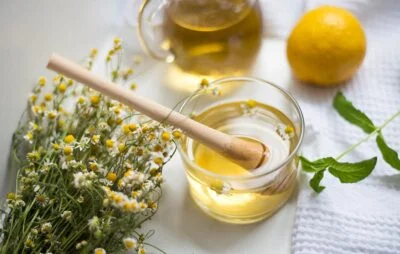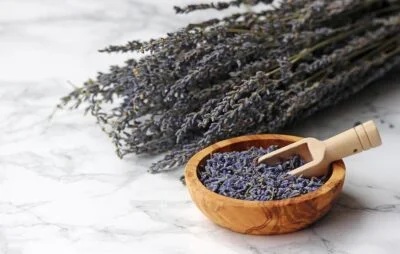
These days, there’s no shortage of gizmos, gadgets, and medications designed to improve your sleep. While many of these products are great (and hey, we’ve even tested out a few of them here at Sleepopolis), the sheer quantity can be overwhelming. And sometimes, less is more. If you’re looking for a less tech-focused or pharmaceutical way to catch some zzz’s, we’ve got you covered. We rounded up the best natural sleep remedies on the market and spoke with a certified sleep expert for her take on what works and why.
While there are a lot of effective OTC medications designed to help folks snooze peacefully, switching to an organic sleep remedy like those we’ve assembled here has its benefits:
- Safety. The best natural sleep aids are generally considered safer than prescription drugs, mostly because they tend to have fewer negative side effects. Many common OTC medications can cause next-day drowsiness, headaches, nausea, and dizziness.
- Price point. Almost all of the products on our list can be found inexpensively online, which makes them highly accessible.
- Longevity. Many of these remedies have been used for centuries, a fact that speaks to their efficacy.
While all these benefits are noteworthy, it’s also important to point out that since most natural sleep aids are derived from herbs, they’re not regulated by the FDA. Before taking new supplements or medications, it’s always wise to consult your healthcare provider first.
Best Natural Sleep Aids
Ashwagandha
Ashwagandha (AKA Indian ginseng and winter cherry) comes from a small evergreen shrub found in India and parts of Asia. The herb is commonly used in Ayurvedic medicine, and increasingly, people are turning to it as a natural sleep aid. Some research suggests it can help people fall asleep faster and spend more time sleeping, while also improving sleep quality.
“The effect of ashwagandha on sleep is mild and primarily works by promoting relaxation,” explains Chelsie Rohrscheib, a neuroscientist and the head sleep expert at Wesper. “Unfortunately, it’s not likely to help with chronic sleep issues such as anxiety, but it can be used by individuals that have occasional sleep problems.”
Ashwagandha capsules are pretty easy to find. “Studies have shown that taking 600mg of ashwagandha is safe for promoting sleep,” says Dr. Rohrscheib. Other potential benefits of ashwagandha include:
- Relief from physical symptoms of stress
- Reduced inflammation
- Improved athletic performance
Some people taking ashwagandha report gastrointestinal symptoms, like diarrhea, nausea, or vomiting. Although rare, ashwagandha can also cause liver problems
Magnesium
Magnesium is an important dietary mineral. But Dr. Rohrscheib says a specific form of magnesium, known as magnesium glycinate, has also been shown to mildly improve sleep. “First, it affects the nerves that stimulate our muscles and promotes muscle relaxation,” she says. That’s why magnesium is often recommended to people who suffer from muscle cramps at night and those with restless leg syndrome. “Second, like many sleep supplements, magnesium promotes the activity of GABA in the brain, which helps us sleep.”
Look for magnesium as a topical option or in supplement form. The former can be sprayed and rubbed onto tight muscles to promote physical relaxation, which may be all you need to nod off. Otherwise, “up to 500 mg of magnesium glycinate can be safely taken with dinner,” says Dr. Rohrscheib.
As an essential mineral, magnesium plays a part in over 300 enzymatic reactions in the body, and imbalances can directly affect your health. Magnesium glycinate specifically may help:
- Relieve anxiety
- Promote bone health
- Boost exercise performance
Some people may experience nausea, vomiting, diarrhea, or upset stomach. However, side effects are generally rare, except when magnesium is taken in excessive amounts (exceeding 350 mg per day).
Lemon Balm
Lemon balm is a member of the mint family and has been used to treat anxiety, improve mood, and induce slumber since the Middle Ages. Though sleep medicine has improved greatly since the time of knights and feudal overlords, the herb is still a popular calming agent most commonly seen in teas and lotions.
Part of the reason why it’s remained a favorite drowsy go-to is because there’s been a lot of research done to support the relaxing hype, with a study finding lemon balm to be effective at reducing anxiety and restlessness.
Lemon balm tea can be an easy addition to your bedtime routine. Try sipping a cup 30 minutes or so before bed to benefit from its relaxing effects. Lemon balm has also been used to:
- Improve appetite
- Relieve gas and bloating
- Treat insect bites
Side effects are often mild and can include nausea, dizziness, wheezing, or increased appetite. People who are pregnant or breastfeeding shouldn’t take lemon balm, and it shouldn’t be taken daily for longer than six months.
Chamomile

Chamomile is another ancient medicinal herb with a history that stems back hundreds of years. A member of the daisy family, this flowery plant is packed with flavonoids that may help relax the body and encourage sound sleep. Several small studies have shown an improvement in the sleep quality of postpartum and elderly groups. Usually seen in teas, chamomile is a highly accessible natural sleep aid that you can find in most grocery stores and pharmacies.A soothing cup of chamomile tea is another ideal bedtime habit. Like the lemon balm, enjoy a mug about 30 minutes before bed to reap the drowsy benefits. Chamomile may also help ease:
- Nausea
- Vomiting
- Heartburn
- Skin irritations when used as a topical
Side effects are mild, but it can cause drowsiness (a good thing when you’re trying to fall asleep!).
Related: The Best Chamomile Tea
Kava Kava
Kava kava, or just kava, is a crop of the Pacific Islands and has long been regarded as an effective natural sleep aid. Though historically popular among the native populations of Hawaii and in some parts of Micronesia, the tropical plant has only recently started to be used as an herbal medicine elsewhere.
The medicinal benefits are derived from the bitter root of the plant, which is said to have sedating effects. Research is limited and most studies were published before 2010, but they seem to suggest that the herb could be useful for managing stress and reducing anxiety.
Kava is mostly available in pill form, which you can take either during the day or at night. In addition to its use as a sleep aid, kava is also used to:
- Relieve stress
- Aid withdrawal from a specific class of drugs, though clinical research is lacking to prove its efficacy
Be aware, using kava can impair driving or the ability to safely operate machinery.
Tart Cherry

In recent years, tart cherry juice has gained traction as a natural sleep aid. Why? Because tart cherries are rich natural sources of melatonin, a hormone that’s been shown to induce slumber. While your body produces melatonin on its own (specifically in the pineal gland in the brain), adding an outside source of melatonin to your body’s natural supply can sometimes help improve your sleep.
While the idea sounds good in theory, only very limited clinical research has been conducted into tart cherry’s direct impact on slumber. However, a small 2018 study did find that tart cherry juice improved self-reported sleep among older adults with insomnia, and there is a good amount of anecdotal evidence from satisfied users.
If you want to try this remedy, you could either drink tart cherry juice or take a tart cherry pill supplement. Keep in mind that supplements tend to work best with consistency, so you may need to take these nightly for at least a week before you begin seeing results. Tart cherry juice is high in antioxidants and it may:
- Offer protective benefits to brain cells
- Help reduce muscle soreness
Keep in mind that diarrhea is a possible side effect of tart cherry products.
Valerian Root
Valerian root has been used as a medicinal herb since at least the time of Ancient Greece and Rome. Over the centuries, it has taken on many uses, from cough-reducing tea to mood stabilizer, sleep aid, and even elf repellant in Medieval Sweden (apparently, it was quite effective).
Nowadays, most folks take it in tea form to reduce anxiety and relax the body. A 2020 review of 60 studies relating to the efficacy of valerian as a treatment for sleep issues concluded that it could be a safe, effective herb for promoting sleep.
Valerian root tea has its pros and cons. While it works quickly, it has a slightly bitter flavor that may not be palatable for everyone. Research is limited, but valerian root may also be taken to manage symptoms of:
- Premenstrual syndrome and menopause
- Headaches
- Depression
Side effects of valerian root can include headache, excitability, upset stomach, dry mouth, and a sense of unease.
Lavender

Lavender is one of the most popular medicinal herbs around and has been used to treat a myriad of different ailments, from topical burns to joint pain, bug bites, body tension, and poor sleep. A 2020 study found that the application of lavender oil to palliative care patients enhanced various aspects of sleep, including latency and quality, with researchers calling it an effective, reliable way to improve sleep.
As far as taking it for improved slumber, you can use lavender-based sprays, lotions, creams, teas, or simply take a big whiff of the stuff right before bedtime to help induce relaxation. In addition to being a helpful sleep aid, other potential benefits of using lavender include:
- Potential decreases in anxiety and depression
- Reduction in pain and inflammation
- Reduced menstrual pain
However, side effects of lavender can include diarrhea, headache, and constipation. It may also irritate the skin when used topically.
Related: The Best Lavender Supplements For Sleep
Passionflower
Native to Central and South America, this genus of flowering plants has been used for centuries to treat everything from skin boils to ear infections, restlessness, and stress-related fatigue. In our modern times, passionflower extract is often used to treat anxiety and insomnia.
While the research is somewhat limited as to whether or not passionflower is actually effective at inducing slumber, there’s a lot of anecdotal evidence to suggest that it is. To use, simply empty a dropper of passionflower extract into a glass of water, stir, and enjoy. I tried it out and found it to be quite calming; however, as with valerian root, it does have a mildly bitter taste.
- In addition to drowsiness, passionflower may cause confusion or uncoordinated movement.
- It may also trigger uterine contractions, so it shouldn’t be taken during pregnancy.
Good Sleep Hygiene
Remember that good sleep hygiene goes a long way to set you up for quality sleep. These natural sleep-inducing behaviors and habits signal the body that it’s time to wind down for bed.
- Keep the bedroom dark, cool, and quiet. Cooler temperatures help promote sleep, so try to keep your room between 60 and 67 degrees (this may vary depending on how thick your bedding and pajamas are!). And since the circadian rhythm responds to light and dark, blocking out light serves as a signal to up melatonin production in preparation for sleep. Finally, keep the noise to a minimum to avoid disrupted sleep.
- Stick to consistent bed and wake-up times. Going to bed and getting up around the same time every day helps regulate your circadian rhythm, which makes it easier to fall asleep at night.
- Avoid napping. While it’s not unusual to feel sleepy in the afternoon, even a quick nap can make it harder to fall asleep at bedtime.
- Skip the blue light. The blue light emitted from your television, video game console, or smartphone can trigger the brain and circadian rhythm just like sunlight. It’s a good idea to avoid using these devices at least an hour before bed to better promote sleep.
- Avoid heavy meals, alcohol, and caffeine before bed. A big meal too close to bedtime triggers the digestive system, which makes it harder to wind down for sleep. Alcohol and caffeine, meanwhile, can delay sleep or lead to disrupted sleep.
Try creating a soothing sleep routine by incorporating these tips and some relaxation techniques. Reading a book, praying, completing mindful breathing exercises, gentle yoga poses, meditation, or taking a warm bath or shower are all options worth exploring.
The Last Word From Sleepopolis
Natural sleep remedies can be a lifesaver if you need a little help powering down and drifting off. From teas to topicals, many natural sleep remedies slot nicely into a soothing bedtime routine to prime you for a great night’s sleep. But remember, if sleep issues are becoming an issue, it’s always a good idea to speak with a healthcare provider.


























